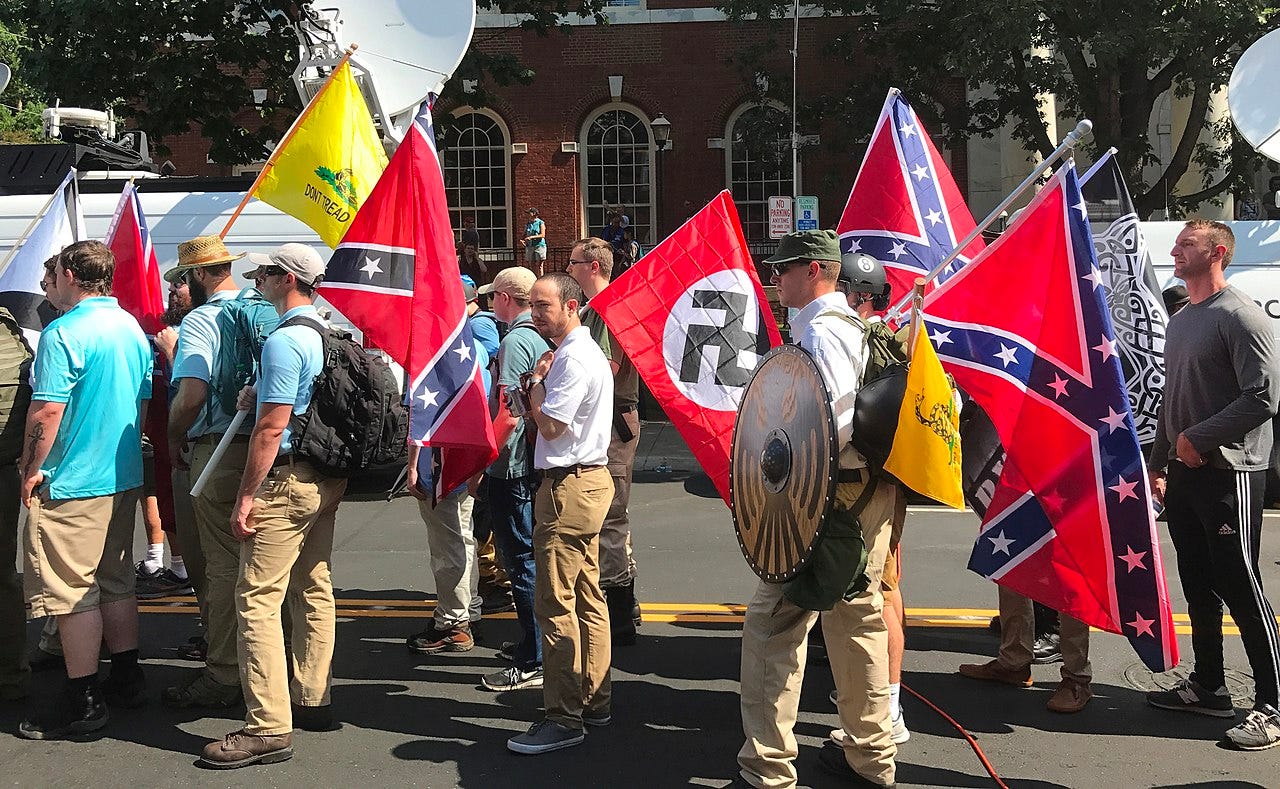There are people in America taking it pretty personally now that hundreds of thousands of other Americans are calling them Nazis and being joined by millions of non-Americans. Part of it, I think, is that it’s hard to find a group of people in the world or in history that have been more vilified than the Nazis.
During the 1930s, most Americans weren’t particularly bothered by the Nazis. In some parts of America, the Nazi party was as popular as it was in Germany. Most Americans weren’t that bothered when France and Poland fell, and there was discussion that maybe it didn’t matter if Great Britain fell.
When it became clear that we would have to fight these people, the entertainment industry in America started a campaign to dehumanize the Nazis as much as possible. Dehumanizing them makes American boys less likely to have sympathy or empathy for them. Sympathy and empathy can make it really difficult to pull the trigger to kill somebody, even if they’re your enemy. There came a point in the war when American Newspapers ran headlines like “Fury of Nazi ‘Werewolves’ to Be Unleashed on Invaders,” warning the folks back home of what our brave boys faced.
Another pretty serious problem was that we were sending over so many boys who were from German and Italian families. We had to figure out a way to make their allegiance to the Allied forces, not their own kinsman.
What we ended up with was a situation where it became very difficult for Americans to see what Germans and Nazis were actually like as human beings. They became, and remained, caricature in the American culture, an example of what we are not—even though we are, and always have been.
If you look at what was happening in parts of the Deep South in the 1930s and 1940s, it becomes much more challenging to distinguish the difference between us and the Nazis. We had concentration camps, too. They were called Angola and Parchman. Saying, “Yeah, but that’s where criminals went!” sounds an awful lot like what Germans in the 30s were saying about Auschwitz.
Prior to the rise of Adolph Hitler and his party, Germany, particularly Berlin, was one of the most progressive, empathetic places on Earth. Far more progressive than New York or Chicago. It was this atmosphere that made the Germans leaders in every artistic movement, painting, cinema, theater, literature, and music. That’s where I come in. Most of what I know of the world comes from my study of art, and especially cinema.
Berlin became a place where people could express who they were according to their sexuality, and women could allow their intellect free reign. That environment attracted an American novelist named Christopher Isherwood and an English feminist named Jean Iris Ross Cockburn. They became friends and allies. Their friendship ended with Jean having an abortion that might or might not have been Isherwood’s child, as he was bisexual (but predominantly homosexual.) You know them as Clifford Bradshaw and Sally Bowles. Their story is what we call “Cabaret.”
American art rarely depicts the transformation of the industrious, honest, decent German people into Nazis. I think that’s a missed opportunity. When we do, we often show them as some werewolves transformed by Hitler’s full moon. Liesl falls in love with Rolf, who betrays her and the Von Trapp family.
Germans, like Americans and most people on the planet, were suffering from an economic collapse after World War I. The Nazis blamed the economic condition of Germany on The Treaty of Versailles, but Americans were suffering even more, and we weren’t even part of the treaty. The real cause of the economic crisis in the world was most likely the vast accumulation of wealth by a few banking interests here and in Europe. Promising real change, one of the first things Franklin Roosevelt did was, like his cousin Theodore, he went after the super-rich in America who were hoarding the country’s wealth. (Some of this should start to sound familiar.) The tactic worked for Theadore, and it worked for Franklin, albeit slowly. You’d be surprised how many people are still willing to argue that it’s a good thing if a tenth of one percent of the population controls most of the country’s wealth. Maybe they’re not so good with math.
Economic insecurity made your average, decent German afraid for their security. People who are afraid for their security are easily manipulated. It doesn’t mean they’re stupid or evil or anything like that. It means life is uncertain, and when faced with uncertainty, nearly all of us will reach out for whatever rope is thrown at us.
The transformation of Germany was astonishingly fast. Isherwood and Ross barely had time to escape. Isherwood published “I Am A Camera,” and Ross became one of the most important feminist writers in British culture, a far cry from how she’s portrayed in the film. Shooting the film version of Cabaret, there was some concern that Ross might halt the production with a lawsuit because it depicted her abortion. Ross had been very public about her abortion for thirty years. She was more concerned about the script portraying her as an airhead but ultimately let it pass. Her work as a writer was far more important than her reputation as “the woman who inspired Sally Bowles.”
Wanting to win their election, there will always be a segment of Democrats who try to dehumanize Republicans. To be fair, there will always be a segment of Republicans who try to dehumanize Democrats. That’s where we are with politics in this country, and we’ve been there quite a while. When people started drawing parallels between the Trump party and the Nazi party, it was pretty easy to dismiss it as just that sort of political dehumanization, but even very early on, there were people saying “no, wait, there really are very disturbing parallels between what Trump is proposing and what Hitler did. It’s also very disturbing that there’s an openly fascist element to Trump’s support.” This was never so clear as after what happened in Charlottesville, Virginia, at the “Unite The Right” rally, where Trump refused to distance himself from the people carrying nazi flags. He still refuses to. He even once told the Proud Boys to “Stand back and stand by,” which had chilling echoes of things Hitler said.
So, why didn’t these decent, industrious, artistic Germans turn on Hitler once he made it clear what he was? I think each of us has a seed of hate inside us. I don’t believe it’s bigger in some people and smaller in other people. I think that seed of hate is as big in me as it was in Hitler and Mother Theresa. The difference is how hard you’re willing to fight to keep that seed from germinating. Rough economic times, shrinking buying power, and shrinking social standing make even the kindest people susceptible to germinating that seed in them.
When I’m alone, I ponder questions like “Will historians a hundred years from now draw parallels between the Obama years and the Weinmar Republic, and the Trump years and the rise of fascism in Europe? People are already making that assertion, but I honestly believe you have to have the space of time to see things clearly.
The German people weren’t werewolves waiting for Hitler’s full moon to turn them into murderous savages. Mississippians weren’t werewolves waiting for Ross Barnett’s full moon to turn into murderous savages and tear Oxford, Mississippi, apart and later murder Medgar Evers. Most Trump supporters are just normal, decent people worried about the loss of social status they perceived when Obama opened up what’s “socially acceptable” by opening the doors to gay and transgender people. They’re worried about the loss of their spending power but unwilling to even consider that the problem might be the meteoric rise in how much wealth is being hoarded by the tenth of one percent.
Calling people nazis doesn’t have to mean they’re the dehumanized cartoons most of us think of. Calling people nazis might mean, “This happened to these decent people, don’t let it happen to you.”
I don’t believe there are good people and evil people. I think there are only good people who sometimes find their intentions compromised by insecurity and poor choices.
“Even he who is pure of heart and says his prayers by night may become a wolf when the wolfsbane blooms and the full moon shines bright.”
The wolf exists in all of us. It takes surprisingly little to bring it out. Recognizing this is very likely the first and best step to preventing it.








When people willfully ignore those news sources that engage in fact-checking because they only trust a news source that does not fact-check (and plays to the person's fears and prejudices) something more than compassion is required to get their attention. When an alcoholic is in denial, family members are often told that they must be *willing* to leave - as in divorce from - the alcoholic if they hope to create change. It takes a huge effort to break the binds that sustain the enabler. In that context, compassion for the alcoholic is appropriate. Otherwise it is just an aspect of enablement. Calling Trump supporters nazis or other names may just increase their alien-nation, but it is understandable. Still, we need a better plan. And we need a better form of leverage.